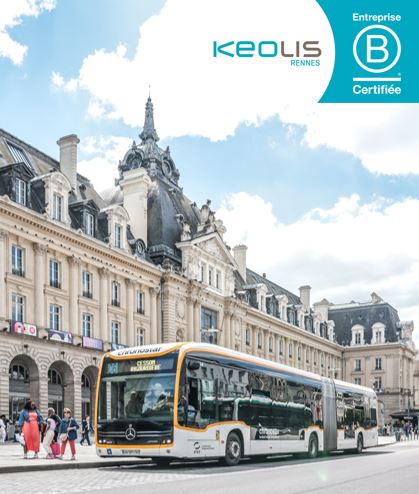

KEOLIS Rennes

Brittany, France
December 2024
Other transport equipment
Service with Significant Environmental Footprint
France
Keolis Rennes is a subsidiary of Groupe Keolis, a pioneer in the development of public transport. The Keolis group is the partner of public decision-makers who want to make shared mobility a lever of attractiveness and vitality for their territory. A world leader in the operation of automated metros and tramways, Keolis is backed by a strong policy of innovation. Keolis Rennes is a company with over 1,200 employees whose mission is to operate the public transport network (bus, metros, bikes, car-sharing, etc.) for the city of Rennes (France). The key actions of Keolis Rennes : -Providing accessible public transport solutions while reducing our carbon footprint and promoting sustainable mobility. The company's climate policy, certified in January 2024 by the Science Based Targets Initiative (SBTI), is aligned with the Paris Agreement. -Promote local commitment by favoring local purchases (64% of sales come from local supplies), signing the Rennes Métropole circular economy charter and partnering with local organizations involved in culture, health and the environment. -Engage with passengers by promoting social and environmental causes and disclosing the greenhouse gas emissions of our transport services every year. -Working for our employees by reducing workplace risks, supporti
Overall B Impact Score
Governance 12.4
Governance evaluates a company's overall mission, engagement around its social/environmental impact, ethics, and transparency. This section also evaluates the ability of a company to protect their mission and formally consider stakeholders in decision making through their corporate structure (e.g. benefit corporation) or corporate governing documents.
What is this? A company with an Impact Business Model is intentionally designed to create a specific positive outcome for one of its stakeholders - such as workers, community, environment, or customers.
Workers 25.0
Workers evaluates a company’s contributions to its employees’ financial security, health & safety, wellness, career development, and engagement & satisfaction. In addition, this section recognizes business models designed to benefit workers, such as companies that are at least 40% owned by non-executive employees and those that have workforce development programs to support individuals with barriers to employment.
Community 15.2
Community evaluates a company’s engagement with and impact on the communities in which it operates, hires from, and sources from. Topics include diversity, equity & inclusion, economic impact, civic engagement, charitable giving, and supply chain management. In addition, this section recognizes business models that are designed to address specific community-oriented problems, such as poverty alleviation through fair trade sourcing or distribution via microenterprises, producer cooperative models, locally focused economic development, and formal charitable giving commitments.
Environment 28.4
Environment evaluates a company’s overall environmental management practices as well as its impact on the air, climate, water, land, and biodiversity. This includes the direct impact of a company’s operations and, when applicable its supply chain and distribution channels. This section also recognizes companies with environmentally innovative production processes and those that sell products or services that have a positive environmental impact. Some examples might include products and services that create renewable energy, reduce consumption or waste, conserve land or wildlife, provide less toxic alternatives to the market, or educate people about environmental problems.
What is this? A company with an Impact Business Model is intentionally designed to create a specific positive outcome for one of its stakeholders - such as workers, community, environment, or customers.
Customers 3.4
Customers evaluates a company’s stewardship of its customers through the quality of its products and services, ethical marketing, data privacy and security, and feedback channels. In addition, this section recognizes products or services that are designed to address a particular social problem for or through its customers, such as health or educational products, arts & media products, serving underserved customers/clients, and services that improve the social impact of other businesses or organizations.